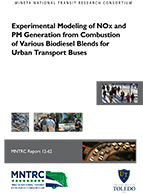Abstract:
Biodiesel has diverse sources of feedstock and the amount and composition of its emissions vary significantly depending on combustion conditions. Results of laboratory and field tests reveal that nitrogen oxides (NOx) and particulate matter (PM) emissions from biodiesel are influenced more by combustion conditions than emissions from regular diesel. Therefore, NOx and PM emissions documented through experiments and modeling studies are the primary focus of this investigation. In addition, a comprehensive analysis of the feedstock-related combustion characteristics and pollutants are investigated. Research findings verify that the oxygen contents, the degree of unsaturation, and the size of the fatty acids in biodiesel are the most important factors that determine the amounts and compositions of NOx and PM emissions.
Publications:
Authors:
ASHOK KUMAR, PH.D.
Dr. Ashok Kumar is a professor and department chairman of Civil Engineering at The University of Toledo, Toledo, Ohio. Before coming to Toledo, he worked for Syncrude Canada Ltd. as an atmospheric physicist where he developed, planned, and conducted studies related to the dispersion of emissions of a tar sands plant.
Dr. Kumar received his Bachelor of Science in Engineering (Honors) from Aligarh University in India (1970), his Master of Applied Science from University of Ottawa, Canada (1972), and his Ph.D. from the University of Waterloo, Canada (1978). He is registered as a Professional Engineer in the Province of Alberta, Canada, and is a Diplomat of the American Academy of Environmental Engineers. He is a fellow member of Air and Waste Management Association (A&WMA).
Air and Waste Management Association presented him with L. A. Ripperton Award for distinguished achievement as an educator in the field of air pollution control in June 2003. He was conferred honorary membership in A&WMA in 2014. His research work has focused on finding innovative solutions to fundamental and applied problems in air quality, risk analysis, and environmental data analysis. He was a Co-PI on the TARTA grant and a PI on the MIOH grant on the use of alternative fuels.
DONG-SHIK KIM, PH.D.
Dr. Kim is associate professor of Chemical and Environmental Engineering at University of Toledo. Since joined the faculty, Dr. Kim has worked on several research projects supported by Federal, State, and international funding agencies including NSF, NASA, USDA, Air Force, Ohio Board of Regents, and KIST (Korea Institute of Science and Technology).
His research has focused on biomaterials development and biomass energy. Dr. Kim earned his Bachelor of Science and Master of Science degrees in chemical engineering at Seoul National University, Korea, and his doctorate in chemical engineering at the University of Michigan, Ann Arbor. Dr. Kim is an active member of the American Institute of Chemical Engineers, American Chemical Society, and American Society of Engineering Education.
Recognized for his achievements in research and education, he received deArce Memorial Endowment Award, Kohler Junior Faculty Award, and Outstanding Undergraduate Research Mentor Award. He is a recipient of the Air Force Summer Faculty Research Award in 2010, 2012, and 2013. He has published 50 articles in peer-reviewed journals and presented his work in domestic and international conferences. He received a US Army Achievement Medal in 1987 after 3 years of military service in Korea. He is a registered professional engineer in Michigan.
HAMID OMIDVARBORNA, PH.D.
Hamid Omidvarborna received his PhD in 2016 from The University of Toledo on alternative fuels and air pollution. He has extensive knowledge as a process and quality control engineer. He received his Bachelor of Science in Chemical Engineering from Razi University (2005) and his Master of Science from Isfahan University of Technology (2008), both in Iran. His main research interests are biofuel combustion chemistry, vehicle emission analysis, air pollution monitoring, and atmospheric modeling.
MANIDEEP YARLAGADDA
Manideep Yarlagadda is an environmental graduate student at The University of Toledo and is in the process of completing his MS. His research focus is in the area of variations in NOx and PM emissions from transit buses running on biodiesel with EGR and non-EGR engines. Manideep received his bachelor’s degree in civil engineering from Jawaharlal Nehru Technological University (JNTU), Hyderabad, India, in 2014.
SUDHEER KUMAR KUPPILI
Sudheer Kumar Kuppili is a masters student at The University of Toledo. Sudheer received his Bachelors of Technology in Civil Engineering in 2012 from Chaitanya Engineering College, JNT University, Visakhapatnam, India. He worked as a summer lecturer in 2012 at Chaintanya Engineering College. His work emphasizes biodiesel properties while focusing on the characterization and sensitive analysis of particulate matter and nitrogen oxides released from TARTA buses, which use biodiesel fuel. He conducts relative experiments in the laboratory and also teaches air pollution dispersion modelling. He is interested in air quality regulations and compliances, and has been involved in this project since August 2012.
NADER SAWTARIE
Nader Sawtarie is a chemical engineering graduate student at The University of Toledo and is pursuing his MS. His research focus is in modeling particulate matter (PM) formation from the combustion of biodiesel, and also the synthesis of bio-derived nanoparticles. Nader received his bachelor’s degree in chemical engineering from Bucknell University (Lewisburg, PA) in 2012.


